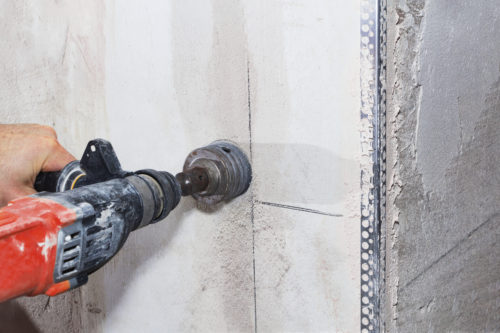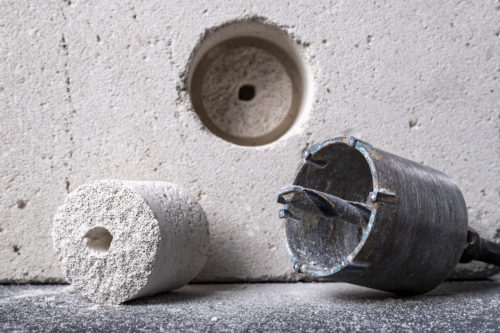Core drilling employs a hollow punch or drill bit to remove a clean core of material for examination. It’s commonly used in mining, concrete work, and other applications to determine the quality, density, strength, and various other properties of a material. In this post, we’ll look at different types of core drilling, when it should be used, and the bit materials used.
Different Types of Core Drilling
There are two different types of core drilling: soft coring and hard coring.
Soft Coring

Soft coring uses a pair of nested barrels. It’s used for unconsolidated material at depths up to 500 feet, though equipment can go further in the right conditions. The inner barrel pushes out to capture the sample. The outside barrel extends to act as a case, preventing the hole from collapsing. Using this technique protects the core sample from any fluid or air employed when moving the outer barrel to avoid contamination.
Hard Coring
Typically used for collecting competent rock samples, hard coring also uses nested barrels, though the outside barrel extends first in this method. This allows the material to be washed with air or drilling fluid without damaging, disturbing, or contaminating it. This process is sometimes called diamond coring due to the diamond-coated drill bit required to cut stone and rock. It’s used in most substrates harder than sandstone and can easily reach depths of 5,000 feet.
When Should Core Drilling be Used?
When you have a project requiring clear definition of geological formations, coring offers a great option. While mud rotary drilling and other techniquescan provide some subsurface data, they may miss up to a three-inch layer of important material. For projects that have little room for error and a significant price tag, having that data provides the difference between success and failure. Though drilling with a core bit can add more steps to your overall process, gaining a solid understanding of geological formations will save wasted time, resources, and effort.
Core Drilling Materials
For softer materials, it’s common to see carbide-tipped core bits, making it possible for the drill to maintain its edge without compromising the core. With harder materials, stepping up to a diamond-tipped bit allows the integrity of the sample to be maintained through cleaner cuts. Though nickel-bonded electroplated diamond core drill bits work for tile, softer stone, glass, and composite materials, harder materials require more.

Metal-bonded diamond core drill bits are the best option for:
- Sapphire
- Very hard alumina
- Materials with high metal content
- Advanced ceramics
- Natural and precious stones
Though it sounds counterintuitive, you need soft bonds for harder materials to allow drilling to take place in a free, fast fashion. By comparison, softer materials that act in an abrasive rather than cutting fashion will need to have hard bonds to ensure long bit life.
Core Drilling From Kadco Ceramics
At Kadco Ceramics, we employ core drills to create deep holes in very hard materials. Please contact us today to see how we can help with your project.

 Thomas Registered Supplier
Thomas Registered Supplier